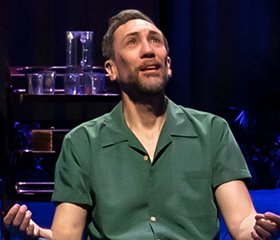Flying Over Sunset tells the story of Cary Grant, Clare Booth Luce, and Aldous Huxley and their experiences with LSD. But there’s a fourth real-life character in the show’s core group: Gerald Heard. Since he could easily be under-sung allow me to sing the praises of his interpreter, Robert Sella.
Singing, in fact, was one of the topics that Sella and I discussed this week between a matinee and an evening performance. It would be easy to assume that Sella, who grew up in Phoenix and who trained across the street from LCT at the Juilliard School, has had a career centered on the non-musical stage. “In fact,” he told me, “of the six productions I’ve done on Broadway four of them have been musicals: My Fair Lady, Cabaret, Chitty Chitty Bang Bang, and now Flying Over Sunset.” He added: “I don’t have a big, trained singing voice but I hope I know how to get a lyric across. And I’m helped in this show by all the expertise around me, especially from Kimberly Grigsby, our brilliant musical director and conductor. She provides real support.”
Heard, Sella’s assignment, is also adept at assistance. He guides the three more famous characters through their acid trips. “I do a lot of watching and observing in the play,” Sella said. “I’m there to make sure that they’re okay.”
Sella mentioned one of the technical challenges presented by playing Heard. “The audience sees the vision Clare or Cary or Aldous has when on the drug. But Gerald doesn’t see that vision. So, for example, if Cary is dancing with someone in his vision I have to make sure I keep my attention focused on him, not on his partner. Because Gerald would only be seeing Cary.”
Because Heard spends so much time as an observer it would be easy to overlook what goes into Sella’s performance. But that would be to neglect what the Russian theater theorist Stanislavski once said are the three basic requirements for the actor: “Talking, moving, and listening.” Sella is a very fine listener.
Sella had an advantage over his three costars: “I’m not playing someone about whom people have preconceptions.” He added: “Heard was an amazing person. He wrote books in so many different genres: fiction, philosophy, religion, spirituality. In the show, we don’t learn about all the things he’s done. He’s on the periphery. Yet he’s essential to the moving forward of the narrative.”
Just as the audience has few preconceptions about Heard so do they have few preconceptions about the musical’s story. “That’s the advantage of something new,” Sella said. “They’re not comparing us to people who played the role before or to people who played the role in the movie from which a musical has been adapted.”
Sella is enjoying the advantages afforded by the current preview period. “Once the media coverage builds up – profiles and especially reviews – then a show gets stamped with one or two main conceptions. That simplifies how people think they should respond to something. For the moment, people come in fresh. They feel as if something very electric and special is happening.”
Brendan Lemon is the editor of lemonwade.com
